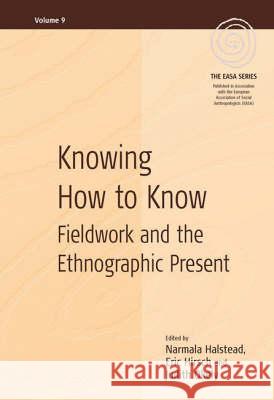Knowing How to Know » książka
Knowing How to Know
ISBN-13: 9781845454777 / Angielski / Miękka / 2008 / 218 str.
"This book is an important stimulus to ongoing debate, and showcases some of the best of recent approaches and challenges to the ways we know what we know." - Ethos This volume examines some crucial issues in the conduct of fieldwork and ethnography and provides new insights into the problems of constructing anthropological knowledge. How is anthropological knowledge created from fieldwork, whose knowledge is this, who determines what is of significance in any ethnographic context, and how is the fieldsite extended in both time and place? Nine anthropologists examine these problems, drawing on diverse case studies. These range from the dilemmas of the religious refashioning of the ethnographer in contemporary Indonesia to the embodied knowledge of ballet performers, and from ignorance about post-colonial ritual innovations by the anthropologist in highland Papua to the skilled visions of slow food producers in Italy. It is a key text for new fieldworkers as much as for established researchers. The anthropological insights developed here are of interdisciplinary relevance: cultural studies scholars, sociologists and historians will be as interested as anthropologists in this re-evaluation of fieldwork and the project of ethnography. Narmala Halstead is a Senior Lecturer in Anthropology at the University of East London and was awarded a Teaching Fellowship by this university. She was a lecturer at Cardiff University and also taught at Brunel University. She has carried out research in Guyana, the U.S. and the UK . She has published numerous articles examining fieldwork encounters, belonging, violence and related issues. Eric Hirsch is a Reader in Social Anthropology at Brunel University. He has conducted research in Papua New Guinea and Greater London. His most recent book is the co-edited Transactions and Creations: Property Debates and the Stimulus of Melanesia (Berghahn, 2004). Judith Okely, Emeritus Professor of Social Anthropology, Hull University, is Deputy Director of the International Gender Studies Centre and Research Associate, School of Anthropology, Oxford University. She co-edited Anthropology and Autobiography (1992) and is researching Anthropological Practice. Other publications include The Traveller-Gypsies (1983), Own or Other Culture (1996) and (co-ed) Identity and Networks (2007).
"This book is an important stimulus to ongoing debate, and showcases some of the best of recent approaches and challenges to the ways we know what we know." · EthosThis volume examines some crucial issues in the conduct of fieldwork and ethnography and provides new insights into the problems of constructing anthropological knowledge. How is anthropological knowledge created from fieldwork, whose knowledge is this, who determines what is of significance in any ethnographic context, and how is the fieldsite extended in both time and place?Nine anthropologists examine these problems, drawing on diverse case studies. These range from the dilemmas of the religious refashioning of the ethnographer in contemporary Indonesia to the embodied knowledge of ballet performers, and from ignorance about post-colonial ritual innovations by the anthropologist in highland Papua to the skilled visions of slow food producers in Italy. It is a key text for new fieldworkers as much as for established researchers. The anthropological insights developed here are of interdisciplinary relevance: cultural studies scholars, sociologists and historians will be as interested as anthropologists in this re-evaluation of fieldwork and the project of ethnography.Narmala Halstead is a Senior Lecturer in Anthropology at the University of East London and was awarded a Teaching Fellowship by this university. She was a lecturer at Cardiff University and also taught at Brunel University. She has carried out research in Guyana, the U.S. and the UK . She has published numerous articles examining fieldwork encounters, belonging, violence and related issues.Eric Hirsch is a Reader in Social Anthropology at Brunel University. He has conducted research in Papua New Guinea and Greater London. His most recent book is the co-edited Transactions and Creations: Property Debates and the Stimulus of Melanesia (Berghahn, 2004).Judith Okely, Emeritus Professor of Social Anthropology, Hull University, is Deputy Director of the International Gender Studies Centre and Research Associate, School of Anthropology, Oxford University. She co-edited Anthropology and Autobiography (1992) and is researching Anthropological Practice. Other publications include The Traveller-Gypsies (1983), Own or Other Culture (1996) and (co-ed) Identity and Networks (2007).











